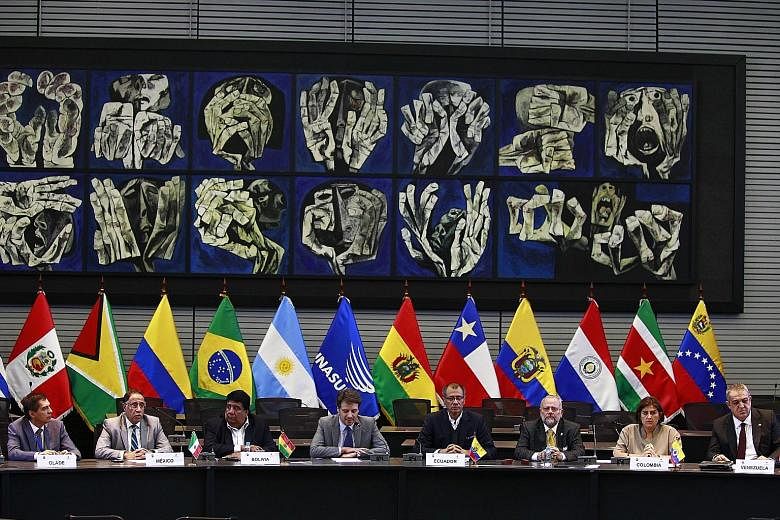QUITO (Ecuador) • Oil-producing countries must take the necessary steps to stabilise the global crude market in a bid to improve prices, Ecuadorean Foreign Minister Guillaume Long has said on behalf of Latin American nations after a gathering in Quito.
Waiting for the market to balance itself would be "catastrophic", Ecuadorean Oil Minister Carlos Pareja had said before the meeting on Friday.
Ecuador, the smallest member of the Organisation of Petroleum Exporting Countries (Opec), hosted the talks ahead of a summit of producers in Doha, Qatar, on April 17.
"We are going to give a message of support," Mr Pareja said.
But global oil producers will not discuss output cuts at the Doha meeting, he added.
With output declining everywhere in Latin America, from Mexico to Brazil, the region's stance is more of a plea for action as the global glut is coming from places like North America, the Middle East and Russia. Venezuelan Energy Minister Eulogio Del Pino, one of the most vocal advocates of a production freeze, reiterated in Quito his call for Opec and non-Opec nations to seek an oil price "balance".
He said Opec should wait five months after the Doha meeting before implementing cuts.
Colombia, which is not an Opec member, plans to attend the talks in Doha but will not support adopting quotas as its output is already falling, Mines and Energy Minister Maria Gutierrez said.
Doubts were cast on the likelihood of a deal after Saudi Deputy Crown Prince Mohammed Salman said his kingdom would freeze output only if Iran did so. Iran, however, is determined to regain market share lost during the past few years due to sanctions over its nuclear programme. Kuwait this week renewed optimism that producing nations can reach an agreement after its governor to Opec, Mr Nawal al-Fezaia, said a freeze can be reached even without Iran.
Oil rose the most in two months on Friday as US crude production continued to slide. The price has jumped more than 50 per cent in New York since falling to a 12-year low in February.
West Texas Intermediate (WTI) for May delivery advanced US$2.46 to close at US$39.72 a barrel on the New York Mercantile Exchange. It was the biggest gain since Feb 12. Futures climbed 6.6 per cent in New York.
Brent for June settlement rose US$2.51, or 6.4 per cent, to US$41.94 a barrel on the London-based ICE Futures Europe exchange. The front-month contract closed at an eight cent discount to the second-month one.
Global benchmark oil closed at a 95 cent premium to June WTI. But prices are still down by over 60 per cent from their mid-2014 peak, crimping public finances in countries that depend on petrodollars.
"I'm not buying this rally," said Mr Stewart Glickman, an equity analyst at S&P Capital IQ in New York. "We went from US$26 to US$41 on optimism that something will happen to curb supply. The risks of a sharp downturn remain greater than those for a rally."
BLOOMBERG

